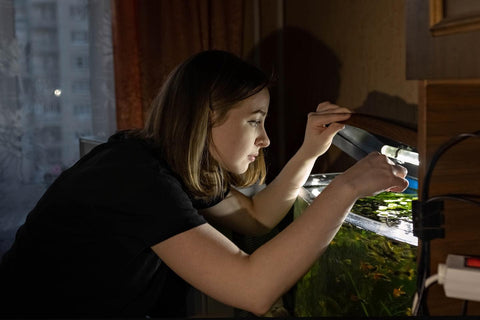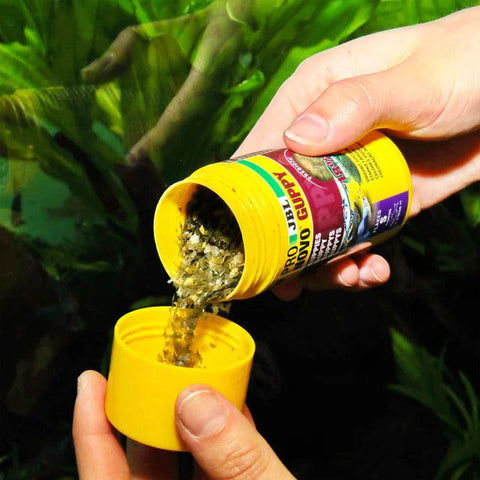Feeding your fish in the aquarium is an important aspect of aquaristics. Adequate nutrition not only contributes to the well-being of your fish, but also to maintaining a healthy ecosystem in your aquarium. However, it is important to consider the correct amount and frequency of feeding to avoid potential problems such as overfeeding or contamination of the water.
The right feeding frequency
The frequency of feeding depends on various factors, including the type of fish, their size and their metabolism. In general, you should feed your fish once or twice a day. This will ensure that they get enough food without overfeeding. Some fish can also manage with less food and should be fed less accordingly.
Watch your fish
It is important to observe your fish during feeding. If you notice that the food is completely eaten within a few minutes, you can increase the amount. However, if there is still food floating in the water after a while, you should reduce the feeding amount to avoid overfeeding. Overfeeding can lead to a deterioration in water quality and promote the growth of algae.
A varied diet
A varied diet is very important for the health of your fish. Make sure you offer them a mixture of high-quality flake food, granules or pellets as well as live or frozen food such as Artemia, mosquito larvae or Daphnia. This ensures that your fish get all the nutrients they need and can mimic their natural feeding habits.
Some fish species have specific nutritional requirements. For example, herbivorous fish such as some catfish species require a plant-based diet, while carnivores such as predatory fish rely on a protein-rich diet. Therefore, find out about the specific requirements of your fish and offer them a suitable selection of food.
Insert fasting days
It is advisable to regularly give your fish a fasting day. On this day, feeding is stopped completely. This allows the fish to relieve their digestive system and encourages their natural feeding habits. One fasting day per week is usually sufficient to ensure a healthy diet for your fish.
The right amount
It is important to determine the right amount of food to avoid overfeeding. A rule of thumb is that you should only give your fish as much food as they can eat within 2-3 minutes. If the food has not been completely eaten after this time, you have probably fed too much. Dispose of excess food to prevent contamination of the water.
Monitor the water quality
Feeding your fish also has an impact on the water quality in your aquarium. Excess food can lead to contamination of the water and promote the growth of algae. It is therefore important to carry out regular water changes and monitor the water parameters. Good filtration and aeration of the aquarium are also crucial to maintaining a healthy environment.
A brief summary of the most important points
Proper feeding of your fish in the aquarium is crucial for their well-being and the health of the entire ecosystem. By ensuring an appropriate feeding frequency, observing your fish, providing a varied diet and taking fasting days, you can ensure that your fish are optimally cared for. Be sure to consider the individual needs of your fish species and adjust the feeding accordingly. With the right care and attention, your fish will thrive happily and healthily in their aquarium.




Comments (0)
There are no comments for this article. Be the first one to leave a message!